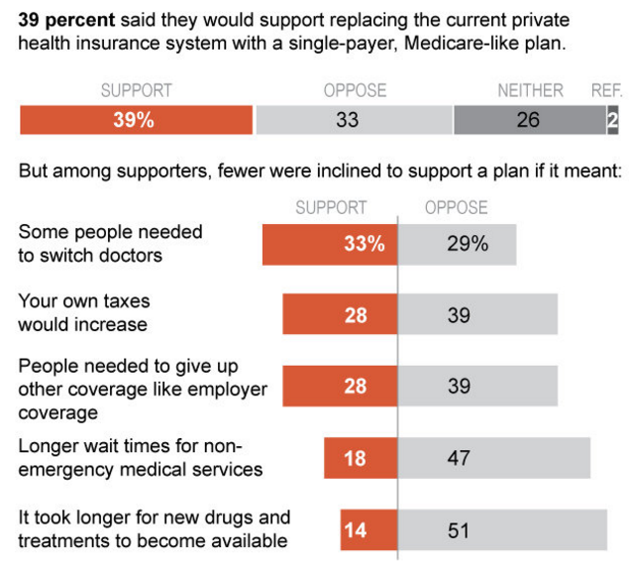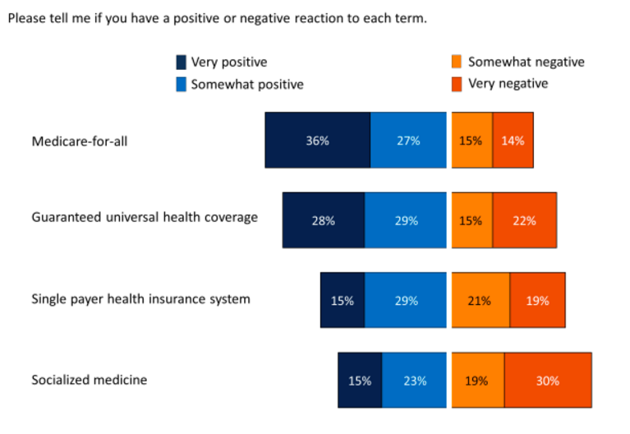Americans Don't Know What ‘Single Payer’ Means
And when they find out, they don’t like it.
Do You Support Single Payer Health Care?
But when asked whether they’d be willing to either pay higher taxes for such a plan or give up their own, employer-sponsored plans for a government-run insurance plan, they were decidedly less bullish. Thirty-nine percent said they would oppose a plan that meant either of those steps. Support thinned further as the pollsters brought up the other potential pitfalls of single-payer systems.
A Kaiser Family Foundation poll, also from Thursday, found that people feel similarly thrown by the phrase “Medicare for All.” Thirty-six percent of respondents viewed that “very positively,” but only 15 percent felt that way about “single payer.”
Medicare for All or Single Payer?
One of the people the AP quoted, a Chicago office manager named Elizabeth Medina, encapsulated the cognitive dissonance that single-payer health care provokes:
“Overall it sounds terrific,” she said. “Yeah! Let's go for it! But Europe and Canada have their problems with the single-payer system ... it’s subpar.”
There are two common points of confusion about single payer. The first is about the definition of “single,” which, as you might know, is “one.” And the “one” in this case almost always means “the government.” It means everyone gives up their Platinum Elite Status Cigna Extra Miles plan that they get at a steep discount from their work. Instead, they go on the same plan everyone else has. This is a key element of Sanders’s proposal, as described on his site: “Under Bernie’s plan, Americans will benefit from the freedom and security that comes with finally separating health insurance from employment.”
The thing is, half of Americans get their insurance through work, and they don't all hate it. A government plan might not be any worse, but it will require a leap into the unknown.
The AP says that higher taxes are also a “given” under single-payer, and that’s probably true, but it’s hard to tell how much people will spend on taxes versus how much they spend now on insurance premiums and surprise ER bills. And it’s worth noting that the AP didn’t bring up any of the positives typically associated with single-payer, like the potential for significantadministrative cost savings.
The other point of confusion is that “Europe” has single-payer health care, and America should be more like Europe. European countries’ medical systems are all pretty different. Some of them, like the U.K., have single-payer health care. Germany has a system much like ours, except the insurers aren’t for-profit companies and it’s cheaper for the patients. Other countries have mixed public-private systems that guarantee a basic level of health care but allow the rich to buy supplemental private insurance.
It sounds like Sanders’s idea could resemble any one of these. In his description, he says, “all you need to do is go to the doctor and show your insurance card.” If everyone were covered by the same plan, it’s not clear why you’d need an insurance card. If there is a card, it’s not clear whether it would be issued by a German-style sickness fund or function more like an NHS medical card.
It’s true, however, that Europe has its own problems, some of them related tosingle-payer health-care systems. America’s existing medical system is no picnic either. But when they’re shown the downsides of single-payer, Americans seem to prefer the devil they know.
http://www.theatlantic.com/health/archive/2016/02/people-have-no-idea-what-single-payer-means/471045/

No comments:
Post a Comment